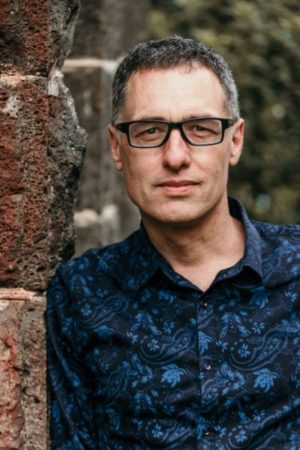Ask the author – Steven Conte
1st June, 2021
In the first in a series of author Q&As, we asked Steven Conte about his 2021-shortlisted book The Tolstoy Estate. You can read his answers below, and watch all the author Q&A videos here.
Q: How do you feel about being shortlisted for the Walter Scott Prize for Historical Fiction?
Shortlisting for the prize has come as a wonderful surprise and an enormous boost. Since completing The Tolstoy Estate I have been attending to various life demands that I neglected during its writing, primarily my finances (I’m currently writing this in a garage that is serving as my temporary home, though admittedly a garage with an outstanding view of Belfast Lough on the outskirts of Port Fairy on the south west coast of Victoria); naturally I’m hoping that the shortlisting will prompt publishers in the UK and the US to take an interest in the book.
Q: How did the people and times you write about in this novel first lodge in your imagination?
The inspiration for the book arrived in a torrent several years ago as I was reading Journey Among Warriors (1943) by Ève Curie. Curie, the daughter and biographer of the dual Nobel Prize winner Marie Curie, wrote her book after touring several theatres of war in 1941 and 1942 on assignment for Time magazine. One of the places she visited was Yasnaya Polyana, the Tolstoy estate, which the Red Army had liberated only two weeks earlier from a six-week occupation by the Germans, including a medical unit that established a field hospital there. Curie was able to interview several of the custodians of the estate, and what caught my attention was her account of the way that those present on the estate, locals and occupiers alike, became intensely conscious of its cultural, ideological and indeed metaphysical significance as the home of Leo Tolstoy, author of War and Peace, the great Russian epic of national resistance to a foreign invader. As a lover of War and Peace, as well as the son of a nurse and the stepson of a doctor, I immediately knew I had found a striking story that I was especially equipped to write.
Q: Do you think stories about the past can help us to deal with the present and think about the future?
Apart from giving pleasure, the great value of the novel as a form is its capacity to foster empathy. By expanding our empathy and understanding of lives lived in the past, historical novels remind us that we are in no position to condescend to the past. Like those who have lived before us, we are constrained by the cultures into which we are born, and just as the old are often dismissed by the young, our own cultural and political biases and preoccupations are certain to be dismissed by future generations as, at best, outmoded, at worst as benighted. This should teach us circumspection. What are our current failings? Personally, I hope that readers of 22nd-century historical fiction will look back with understanding and compassion on the moral imbecility of characters who own and drive fossil-fuelled vehicles.
Q: What has your experience of the pandemic been and has your writing been affected?
My experience of the pandemic has been comparatively easy, not least because Australia has been immensely fortunate in being able to contain the virus. Also, as an older introvert I haven’t particularly minded being in lockdown, while as the parent of a child with autism my routines have been less disrupted than those of other parents, as my son has been permitted to continue attending school. Because of other obligations I haven’t been writing in the last year, with the result that the pandemic’s main effect on my writing has been to prevent me promoting The Tolstoy Estate in person. This has been disappointing, but people are still buying and reading books, and compared to what most people have had to endure I have been exceptionally lucky.
Q: The 250th anniversary of Sir Walter Scott’s birth this year will celebrate his massive contribution to cultural life as a novelist, poet, playwright, designer, lawyer, historian and inventor of the historical novel. Does Scott mean anything to you, and do you see yourself continuing his storytelling tradition in any way?
Walter Scott’s writing had an early and outsized effect on my imagination with his poem “Lochinvar”, which at the age of 12 I learned by heart at the prompting of Mrs Cook, my wonderfully inspirational and traditional Year-6 class teacher. I can recite the poem to this day.
I definitely see myself working in the tradition that Scott established. Incidentally, I also think it is to Scott’s eternal credit that he was able to identify and admire the quite different writing gifts of Jane Austen.
Q: The Walter Scott Prize has a younger sibling, the Young Walter Scott Prize, which is a creative writing prize for young people (11-19 years). If you were asked for one tip to help young writers start writing fiction set in the past (before they were born), what would it be?
To remember that the details from the past that we find exotic and remarkable shouldn’t necessarily seem so to characters who are familiar with that world. In a sense this is a technical problem in all fiction: why do characters notice certain details, and is their noticing natural and plausible? One solution is to choose a viewpoint character who is an outsider, or, better still, a partial outsider, at once knowledgeable about their world but also alive to its oddities.

